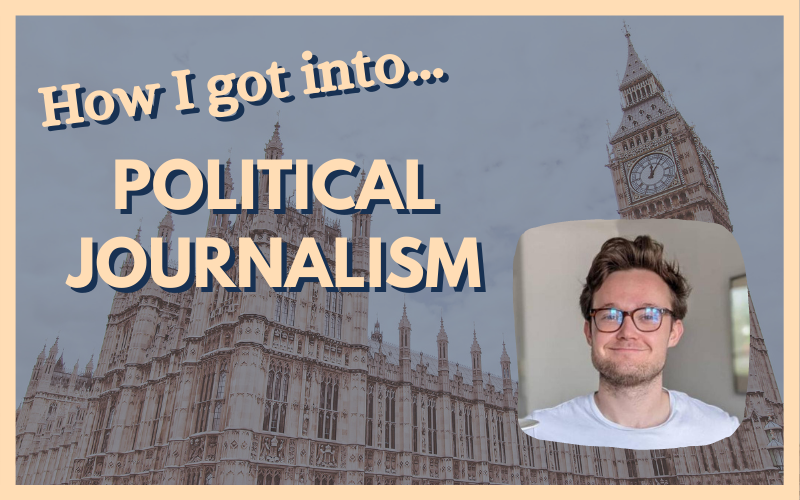We spoke with Alex Brown, Westminster correspondent at The Scotsman and News Associates alumnus, about how he got into political journalism and what his advice would be for people wanting to break into the industry.
Alex’s route into political journalism
How did you get into journalism?
I fell into it really! At university I did a lot of student radio and after I finished, I did some unpaid work at Radio 4 and BBC Wales, where a lot of people said you need an NCTJ if you want a proper job in journalism.
So, I did my NCTJ training at News Associates.
After my training I was a court reporter for a year and a half at Central News, then a lobby reporter for The Daily Star and a political correspondent for The Sun before starting my current job.
I’m now the Westminster correspondent for The Scotsman newspaper, where I lead on all our Westminster coverage working in parliament, filing news lists, and writing stories, analysis and sketches for our paper and website. I also do content to camera, video series and podcasts.
View this post on Instagram
What made you want to become a political journalist?
I like reading and discussing politics all the time anyway, so I might as well make it something I do professionally!
Political journalism seemed like it would indulge my personal interests. What’s the point in doing any job if you don’t enjoy it?
Getting into political journalism
What are your top tips for aspiring political journalists?
So much of becoming a political journalist is who you know and being nice to people and being present when you can.
I got my job at The Daily Star because I had met someone there while covering a court case for Central News and I asked him if they were hiring.
What are your top tips for getting political scoops?
Just remember MPs love getting coverage! If you start off in local news there are so many MPs wanting to talk to journalists, so email them and ask what they think is not getting enough interest.
View this post on Instagram
Do you have any advice for getting noticed on the job?
You’ve got to go out and get things yourself. When I joined The Daily Star, I got into the lobby by just suggesting things. They weren’t particularly interested in political journalism, but I gave them ideas for political stories by relating it to stuff they did care about.
If you are somewhere that isn’t interested in politics, it’s about finding a way to relate it back to the audience you’re with. Everything is linked to politics so find an angle you can get people to comment on.
You’ve got to ask for things and pitch ideas. I pitched a video series for The Scotsman about filming and interviewing candidates around Scotland doing silly things with them, like trapeze and football drills… and they took it!
Some people are more confident walking into rooms than others. But you’ve got to know wherever you are, you’re there because you deserve it.
Do you need to specialise early to become a political journalist?
You can’t just waltz into a political journalism job. Starting in general news then carving out a niche for yourself is the way up and it’s fantastic training.
To be a political journalist you don’t need to be a political expert – it’s about being a good journalist.
Loads of people start out by being hard news reporters rather than being a political obsessives. Be a good journalist first and you can learn anything else on the job.
Is it important to have a social media presence?
Absolutely, a social media presence is important in political journalism.
I get booked for broadcast appearances off the back of my Twitter account and I get asked to do things by producers following and DMing me.
Twitter is essential for journalists – you build up a following by breaking stories and offering a take on something.
For your nugget of #WednesdayWisdom, here’s how to use Instagram as a journalist! ✨ https://t.co/iFPjaWZy4x
— School of Journalism (@TheJournoSchool) May 26, 2021
What was the most important lesson you took from your NCTJ training?
Shorthand is fantastic – I would not have been a court reporter without shorthand. So many journalists don’t have it but being a journalist is so much easier if you do.
My shorthand experience as a court reporter at Central News prepared me really well for working in journalism.
What are your personal career highlights so far?
When I first started reporting in the Old Bailey it was amazing. There have been loads of little moments like that.
When I first got my lobby pass and was able to buzz straight into Parliament and walk past MPs and all the old buildings – it feels like you’re part of history!
The Daily Star sent me to Tunisia to cover the improved security after terror attacks, and I’ve got to interview Keir Starmer and loads of Scottish political leaders.
The first time I knocked on Downing Street was insane and felt like an out-of-body experience. I thought they were going to stop me and say ‘what are you doing?’, but they just let me in!
At The School of Journalism we teach you everything you need to be a political journalist and more! To be invited to our virtual events and find out more about our BA Multimedia Journalism degree, register your interest here.

